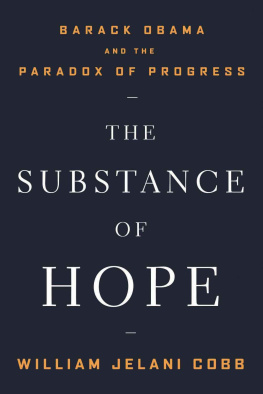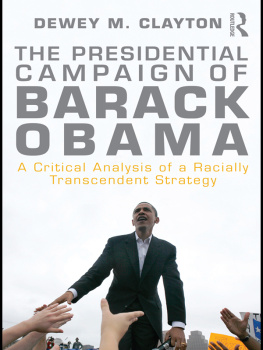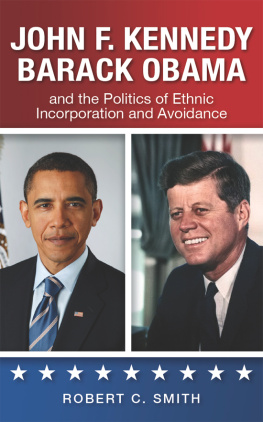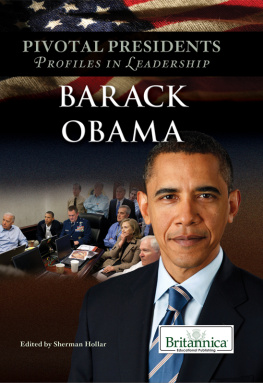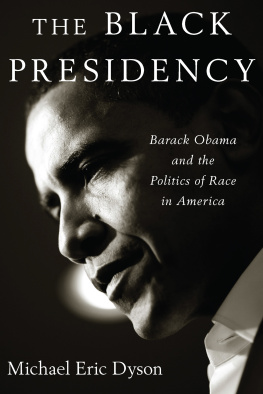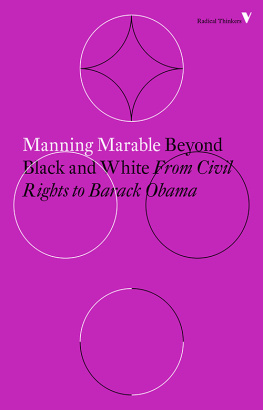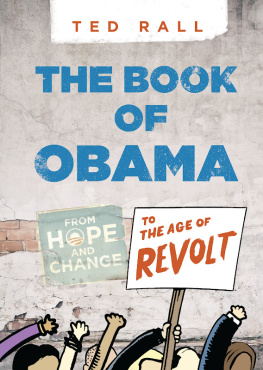
For my nephews William, Terence, and Tymel:
Hope audaciously, work relentlessly.
Now faith is the substance of things hoped for, the
evidence of things not seen.
Hebrews 11:1
Contents
The Meaning of Barack Obama
The Meaning of Change on the South Side of America
The Black President and the President of Black America
The Old Guard and the Age of Obama
The Age Divide and Obama
Nairobi, Denver, and the Road to the White House
Of Lincoln, Roosevelt, and Obama
CHAPTER 1
THE MEANING OF BARACK OBAMA
O N J ANUARY 20, 2009,
a black man stood on the steps of the U.S. Capitol, placed his hand on a Bible held by his wife, and was sworn in as president of the United States. I was there that day, frozen nearly solid but still awed by the magnitude of what I had witnessednothing less than the passing of an old era and the initiation of another. I was born in August 1969, sixteen months after Martin Luther King Jr. took his fateful step onto that balcony in Memphis. I am part of that generation reared in the seemingly permanent shadow of Kings life and the violent way it ended. I have often taken solace in that speech he gave on April 3, 1968, the one where he seemed to dip his toe into the waters of his own mortality as if he somehow knew that he would soon be fully immersed. In that speech he uttered his contralto prediction that we as a people will get to the Promised Land. Since then, at points when our community prospects seemed most bleak, many of us have fallen back on those words, believing that a man who saw his own fate so clearly was capable of seeing ours also. For many, that inauguration day in 2009 was validation of Kings promise.
For the entirety of this nations history the phrase black president had been a contradiction in terms, but in the course of a forty-two-word oath, its terms were reconciled. The moment was not simply about wordsthat was only one of many reconciliations both grand and minute. Consider this: In 1908 Jack Johnson defeated a white man for the heavyweight championship, and race riots erupted in the streets across the country. One hundred years later Barack Obama defeated a white man for the presidency, and the streets were filled with riotous laughter as millions of people simultaneously broke into the Electric Slide.
In addition to bearing the burdens that come with the presidency, Barack Obama is freighted with the vast weight of his own symbolism. His position is so unique and so far outside our expectations as to make him a metaphor for a metaphor. It is possible, almost unavoidable, to see Obamas entire lifefrom birth to inaugurationas a referendum on civil rights causes. This biracial black lawyer who relied on millions of black voters to help him win the presidency serves as an unmistakable reminder of the NAACPs legal battles to end the white primary in the 1930s, its campaign to end segregation in law schools in the 1940s, the Brown v. Board of Education decision in 1954, and the Voting Rights Act of 1965. Without the civil rights movement, the marriage of Barack Obamas African father and his white American mother would have been illegal in most states of the South.
The headline for the New York Times
on November 5, 2008, blared from the page: RACIAL BARRIER FALLS IN DECISIVE VICTORY . Obamas name appeared in ninety-six-point type. Only three events in the papers historythe Apollo landing, Richard Nixons resignation, and September 11 attackswere heralded with equal dimensions. At Ebenezer Baptist, the church once pastored by Martin Luther King Jr., the congregation gathered for a Watch Night service. It was a deliberate recasting of history, an echo of those slaves who gathered on the last day of 1862 awaiting New Yearsthe day the Emancipation Proclamation would take effect. In Nairobi entire communities stayed up throughout the night, anticipating the moment when one of their own descendants would be declared the new president. And in Grant Park in Chicago seven hundred thousand people jammed into the space along Lake Michigan to hear Barack Obama say, Change has come to America.
And it has. But the dimensions and contours of that change are not yet apparent. We will not know its full yield, the ways in which it will alter race and citizenship and possibility, for many years to come.
In the meantime we have filled that space with the metaphors. The American creed of Out of many, one has been turned on its head, a character defined by the ideal of Out of one, many. Barack Obama is the black president and thus the American Mandela, the yield of a once-enslaved peoples aspirations toward freedom. He is a biracial man with family members on four continentsand therefore is the face of the next generation, one that is multiracial and cosmopolitan. His family is a testament to globalism. He is the Democrat who won 53 percent of the popular vote and thus is the punctuation at the end of the Reagan Era. His policies defy the traditional categories of liberal or conservative, thus heralding the end of the tread-worn arguments over the 1960s culture wars. He is shorthand for celebrity, for digital politics, for change and for hope. And somewhere, beneath all that, is a human being who happens to be the forty-fourth president of the United States.
There are other metaphors. A century ago W. E. B. Du Bois published an essay titled Of the Meaning of Progress in his collection The Souls of Black Folk , in which he recounted his days as a teacher in small-town Tennessee. More than a summer job, his task, as he saw it, was part of a monumental undertaking to uplift the race. Ten years after leaving the town, he returned, now a respected professor and the first black man with a Ph.D. from Harvard, but he found that the progress had not been uniform. Some of his former students had died unexpectedly, while others remained mired in conditions scarcely better than slavery. Du Boiss own accomplishments marked a step forward for the black community, but what that meant in the context of the times was hard to interpret precisely. There. Another metaphor, another attempt at bringing light to a circumstance so novel as to be a source of both inspiration and confusion. Obamas election represents progress, its meaning as complex and cryptic as life in Du Boiss Tennessee town.
It is difficult, in fact, to read Dreams from My Father without hearing other echoes from Souls of Black Folk . The Harvard-educated black president had an unwitting kinship with the Harvard-educated black scholar. Both men grew up fatherless in environments where blacks were a small minority. Both mens searches for identity were intricately bound to their ability to decipher the meaning of race. In the early pages of his memoir Obama tells of a haunting a magazine image of a black man who has bleached his skin, in a failed attempt to come closer to whiteness. It becomes a moment of reckoning for him. Du Bois spoke of the point in his childhood when a playmate rejected his friendship and the difference of his skin first dawned on him. These tales are compelling precisely because they are typical. In a society where race is as ambient as air, such moments are usually the hard but regular features of life, not the beginnings of existential journeys.
As a young man, Du Bois left his childhood home in Great Barrington, Massachusetts, for Tennessee and Fisk University. There he first encountered black communities, came to understand black culture, and began to grapple with its implications for his own life. Obama began college in California but then transferred to Columbia University, in part because of its proximity to Harlem. Later Chicagos South Side came to serve for Obama the functions that Nashville had for Du Boisa literal starting place within black America. Their unique experiences made both men variables in the racial equation. Du Bois lived ninety-five years, authored volumes of history, and became the godfather of the civil rights movement. Obamas meaning to race and democracy in this country has yet to be charted, which perhaps more than anything else is the reason we find the story of 2008 compelling. Beneath all the celebration, the commentary, and the joyous merchandising of an American moment, lies this unanswered question: What is the meaning of this progress?
Next page
